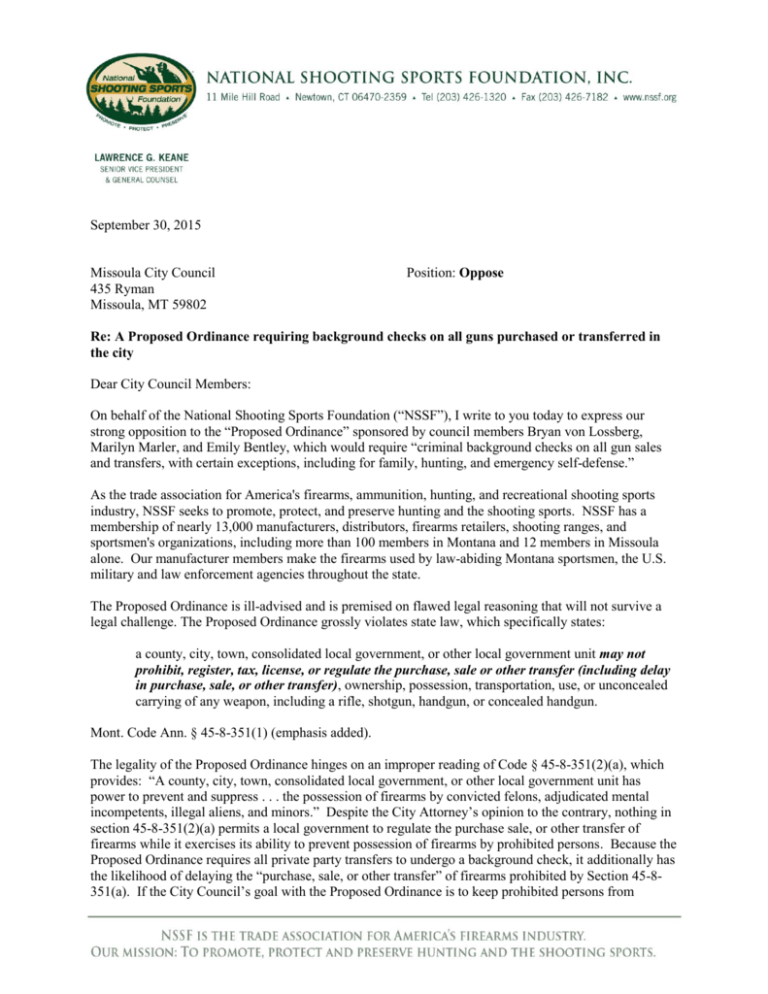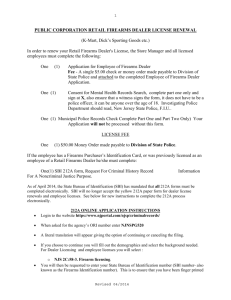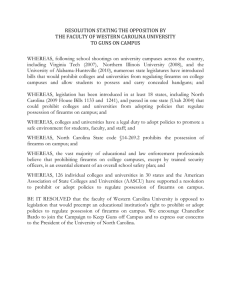NSSF opposes the ordinance - National Shooting Sports Foundation
advertisement

September 30, 2015 Missoula City Council 435 Ryman Missoula, MT 59802 Position: Oppose Re: A Proposed Ordinance requiring background checks on all guns purchased or transferred in the city Dear City Council Members: On behalf of the National Shooting Sports Foundation (“NSSF”), I write to you today to express our strong opposition to the “Proposed Ordinance” sponsored by council members Bryan von Lossberg, Marilyn Marler, and Emily Bentley, which would require “criminal background checks on all gun sales and transfers, with certain exceptions, including for family, hunting, and emergency self-defense.” As the trade association for America's firearms, ammunition, hunting, and recreational shooting sports industry, NSSF seeks to promote, protect, and preserve hunting and the shooting sports. NSSF has a membership of nearly 13,000 manufacturers, distributors, firearms retailers, shooting ranges, and sportsmen's organizations, including more than 100 members in Montana and 12 members in Missoula alone. Our manufacturer members make the firearms used by law-abiding Montana sportsmen, the U.S. military and law enforcement agencies throughout the state. The Proposed Ordinance is ill-advised and is premised on flawed legal reasoning that will not survive a legal challenge. The Proposed Ordinance grossly violates state law, which specifically states: a county, city, town, consolidated local government, or other local government unit may not prohibit, register, tax, license, or regulate the purchase, sale or other transfer (including delay in purchase, sale, or other transfer), ownership, possession, transportation, use, or unconcealed carrying of any weapon, including a rifle, shotgun, handgun, or concealed handgun. Mont. Code Ann. § 45-8-351(1) (emphasis added). The legality of the Proposed Ordinance hinges on an improper reading of Code § 45-8-351(2)(a), which provides: “A county, city, town, consolidated local government, or other local government unit has power to prevent and suppress . . . the possession of firearms by convicted felons, adjudicated mental incompetents, illegal aliens, and minors.” Despite the City Attorney’s opinion to the contrary, nothing in section 45-8-351(2)(a) permits a local government to regulate the purchase sale, or other transfer of firearms while it exercises its ability to prevent possession of firearms by prohibited persons. Because the Proposed Ordinance requires all private party transfers to undergo a background check, it additionally has the likelihood of delaying the “purchase, sale, or other transfer” of firearms prohibited by Section 45-8351(a). If the City Council’s goal with the Proposed Ordinance is to keep prohibited persons from Missoula City Council September 30, 2015 Page 2 possessing firearms, this is already provided for under Montana and federal law, which both prohibit convicted felons, adjudicated mental incompetents, and illegal aliens from possessing firearms. Although the doctrine of implied pre-emption is inapplicable to self-governing local governments such as Missoula, these types of governments may not “perform a function by any means [if] it is prohibited by a specific statute deliminating the powers of self-government local governments, by constitutional norms, or by a provision of its charter.” 51 Op. Att’y Gen. 5 (July 13, 2005); see also D & F Sanitation Serv. v. City of Billings, 713 P.2d 977, 981 (1986). Missoula adopted its self-government charter on June 4, 1996, effective January 1, 1997. Since that day, Missoula has been subject to limitations on the power it may exercise. City Attorney Nugent recognized these limitations in his Legal Opinion No. 2014-007, in which he acknowledges that Section 7-1-111(9) of the Montana Code specifically prohibits a selfgovernment charter government from “exercising any power that applies to or affects the right to keep and bear arms except that the local government has the power to regulate the carrying of concealed weapons” (emphasis added). There is nothing implicit in this clear directive by the state legislature. The limitation on Missoula’s ability to regulate the sale or transfer of firearms is expressly prohibited by state statute and the Proposed Ordinance could not withstand even the weakest of scrutiny. In addition to the legal flaws with the Propose Ordinance, there are a number of other flaws in which the firearms industry takes serious concern with. To begin with, studies have shown that criminals do not purchase firearms through lawful means. Prohibited persons often acquire firearms by theft, the black market, and from family members or friends, and many times by straw purchasers who can legally pass a background check, but give the firearm to someone who cannot. The Proposed Ordinance will not keep firearms out of the hands of criminals, but will only place a burden on those who are law-abiding. According to a 2013 survey conducted by the National Shooting Sports Foundation, firearms retailers overwhelmingly oppose so-called “universal background checks,” similar to the Proposed Ordinance. 1 In fact, 85.8% of retailers surveyed oppose such checks and more than 95% believe such proposals would not prevent criminals from obtaining firearms. The obligations and burdens that would be put in place could be overwhelming for many of those who would be called upon to carry them out. It is unfair to call upon private companies, many of them quite small and with limited personnel, to conduct what essentially would be a function of government. In addition to the burden placed on the retailers, they would also open themselves up to liability exposure (e.g., product liability claims arising from a gun they did not sell, and for which they may thus have no insurance coverage). A background check is only as good as the records in the database. That is why the firearms industry strongly supports improving the current NICS system by increasing the number of prohibiting records states submit to the FBI databases, helping to prevent illegal transfers of firearms to those who are prohibited from owning firearms under current law. Including these missing records will help ensure more accurate and complete background checks. NSSF, on behalf of the firearms industry, was proud to launch the “FixNICS” campaign in September 2013 to encourage states to report to NICS all records that establish someone is prohibited from owning a firearm under current law. Through a multi-state effort focused on forming coalitions in the states with the fewest submitted records, the industry has dedicated significant resources to helping states overcome the legal, technological, and intrastate coordination challenges preventing effective record sharing. “Fix NICS” is about keeping firearms out of the hands of prohibited persons, like the shooter in the Virginia Tech tragedy who was able to purchase a firearm from a federally licensed firearms retailer because his prohibiting mental health records were not in the NICS 1 National Shooting Sports Foundation, Inc., National Survey: Federally Licensed Firearms Retailers Overwhelmingly Oppose ‘Universal Background Checks’, http://www.nssf.org/factsheets/PDF/OpposeBackgroundChecks.pdf. Missoula City Council September 30, 2015 Page 3 system. Unfortunately, Montana is one of the few states that does not submit mental health records to be included in the NICS system. We know these background checks will never be truly “universal” because criminals will not think twice about skirting the law. Additionally, in order for someone to get around the ordinance, all they must do is get outside of the Missoula city limits where a private party transfer can occur without a background check, which could result in reduced business for those Missoula-based FFLs. Finally, and most significantly, the Proposed Ordinance is littered with significant legal defects, which would undoubtedly lead to a legal challenge, causing taxpayer money to be used defending the indefensible. In closing, NSSF respectfully urges you to oppose the misguided Proposed Ordinance requiring “universal background checks.” Sincerely, Lawrence G. Keane cc: Mayor John Engen





